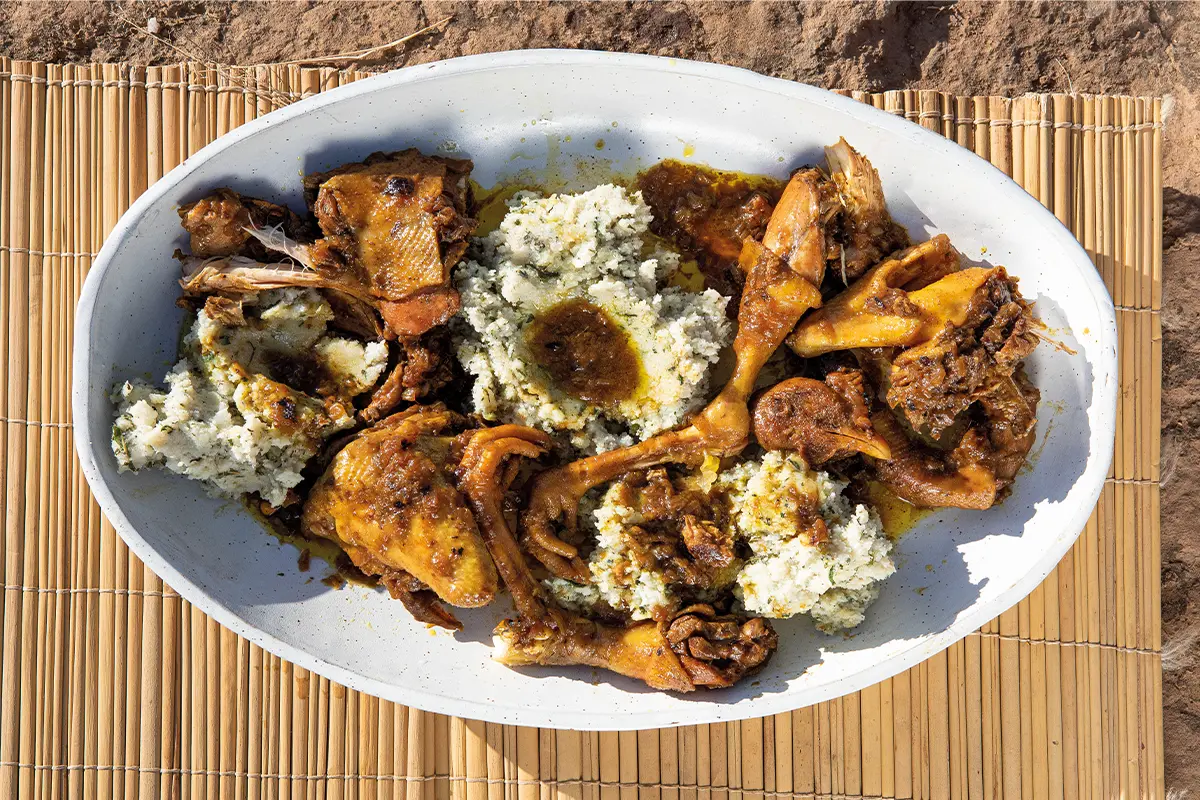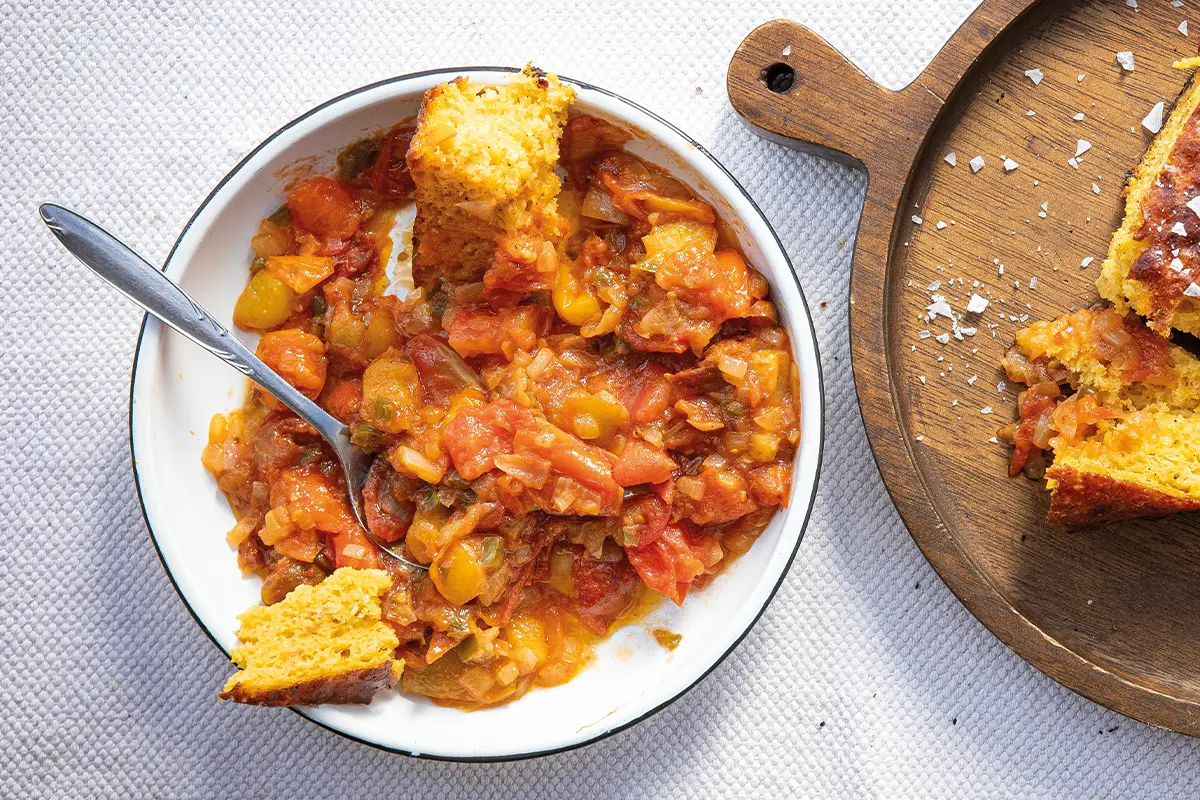Hae Mahaeng: the EC project bringing foodies to Alice
After graduating from Maker’s Landing and co-founding Ukutya, food activist Lipato Shogole decided to return to the Eastern Cape to start a new project with a community at its heart. He shared his vision with Khanya Mzongwana.
The sun descends slowly behind intaba ka ntsikana, a green-cloaked mountainous landscape overlooking the Amathole District in the Eastern Cape, while cows and goats graze on an unattended vegetable patch a few houses away. We’re at Lipato Shogole’s home, seated on his late rakgadi’s (aunt’s) porch, where he passes around an enamel plate piled with snacks and refills our drinks, occasionally prodding at a fire crowded with pots spluttering gravy, bitter wild greens and potatoes charring on the coals.

“I had to slaughter a chicken for my guests, of course,” he says, smiling. Earlier in the day he paid a visit to local chicken farmer Alfred Sidima Ngqawana to make a selection from ooDlaki, or frizzle-feathered chickens, so called because of their characteristic fluffed up “dlakadlaka” feathers. Lipato left with three of the birds, two of which he is keeping as pets and, more conveniently, for supplying him with eggs.
Lipato’s food story begins much like many of ours; his interest in food was established early in his childhood in Motherwell, Gqeberha, when his mother first allowed him to use the stove to prepare food after school. “Mme taught me how to make perfectly fluffy rice and steam veggies instead of boiling them, and soon I was baking bread.” He would eventually cook most of the family meals. Because one of his siblings had a chronic health condition, the family had to make drastic dietary changes, exchanging salt and sugar for natural substitutes, and eating food they’d grown organically in his mother’s food garden. Lipato would later adopt these principles as his own.
ALSO READ: The proudly South African Sunday lunch club you need to try
Farming is also something that has looked after the chickens, ducks and rabbits, collecting eggs and harvesting vegetables. “Here in the village, this is nothing new. Farming is a way of life for pretty much everyone, owning large plots of land is common, and farming is the main means of survival, so these are vital skills.”

Find the recipe for umleqwa here.
Having lived many lives and studied multiple disciplines, he is a maker at heart, preoccupied with beauty, and insistent on things being done from scratch. After obtaining his diploma in fashion design at Northlink College and establishing his street wear label Iskapie, he co-founded the Ukutya food movement with business partner Nabo Binase, through which they championed indigenous ingredients and ancestral cooking practices in the form of curated pop-up experiences. These took shape as hearty three-course Sunday lunches, celebrating ancient African ingredients and contextualising them for the modern palate. They also hosted interactive culinary workshops, including an African bread-baking demo and an umqombothi brewing masterclass, collaborating with the likes of Food Dialogues, a platform that encourages conversation around South Africa’s food system.
A few months after graduating from the V&A Waterfront Makers Landing Incubation Program in 2022, the pair decided to pursue their own respective ventures, with Nabo continuing her work as a writer and researcher, and Lipato buying a piece of land in Umsobomvu, close to his family home in Alice. This is where he wants to build a homestead for his daughter and work on something new.

Find the recipe for multicoloured bhisto here.
His latest venture is the Hae Mahaeng Vernacular Project, a sustainable, solar- powered cropland centred around a mud house, a food garden full of indigenous produce and an outdoor kitchen with facilities for cooking on fire. Lipato plans to promote tourism in the area by creating a residence that will host guests travelling in the Eastern Cape. There will also be a shared studio space. “Hae Mahaeng is a community effort. Friends and neighbours have assisted, offering their helping hands and knowledge,” Lipato says. He buys vegetables locally, supporting subsistence farmers, while learning how to look after the land from the elders. “We exchange seeds and recipes, and they’ve been teaching me the correct ways of doing things in the village.”
The construction of Hae Mahaeng has created employment opportunities, and members of the community help to work the land. Lipato pays tribute to Nobahle Jantjies, who runs a food gardening project and greenhouse nearby, saying she’s been a great source of knowledge. “And one of our elders, Vuyani ‘Bra Vido’ Juta, is also an important part of the Hae story. He knows a lot about everything from mud-house building to identifying traditional herbs, mushroom foraging and attending to crops and livestock. He has taught me so much, including how the wood of umga, the sweet thorn, has been used to impart flavourful, sweet smoke to everything it cooks.”

Find the recipe for umga (sweet thorn bush-roasted potatoes) here.
“I want to change young people’s perceptions of this place. The youth don’t care about rural areas; there are many empty houses because nobody wants to live here. With Hae, I plan to bring a fresh stream of people into the area, breathing new life and turning Umsobomvu into a destination for visitors and locals alike. I have also started collaborating with some of the small food businesses in nearby Hogsback, which already attracts a lot of tourists.” Lipato says that his time in Alice has helped him discover his Xhosa food identity and learn about the local edible landscape. “I first tasted the heirloom squash intyabontyi here, which grows especially well here and looks a lot like a watermelon with firm white flesh – I don’t know the English name! Many people in the village cultivate it to sell to the local market along with many other seasonal crops. You should see the produce some of my neighbours grow!”
As part of his culinary education, Lipato regularly joins local women to forage for wild greens, or imifino, in the area.His neighbour, Unathi Boloti, has taught him how to identify edible plants and discern the difference between the medicinal and the poisonous. “I’ve had fun learning more about the Eastern Cape’s food system and part of my work is sharing that knowledge through feeding people the foods that are native to us.

Find the recipe for fonio coffee cake here.
“What I really love about my new-found community is how quickly they have embraced me as a son and nurtured my curious spirit. I love how everyone knows each other’s business around here, how fondly we all know each family in each house. And I love the trust we have built and how we share our resources. “I want to give back by adding value to the village through this project, creating job opportunities and educating people about Alice’s rich history, culture and cuisine. There is a wealth of precious ancestral knowledge here, which we need to gather from the elders with great urgency. They are our greatest source of learning. My mission is to celebrate their dedication to the land while they’re still with us, and to create a home away from home for all who are lucky enough to pass through our special village.”


Comments